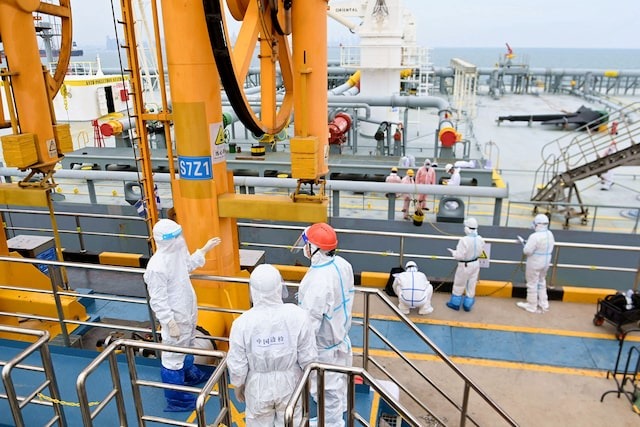Prohibition of entry for sanctioned oil tankers into Shandong ports in China!
sea–News – According to international trade sources, the Shandong Port Group in China’s Shandong Province has decided to ban the entry of oil tankers subject to U.S. sanctions. This province, recognized as one of China’s key hubs for crude oil imports, hosts many independent refineries that process oil from Iran, Russia, and Venezuela.
Shandong’s Decision and Its Impact on Oil Imports
In the past year, Shandong Province imported approximately 1.74 million barrels of crude oil daily from countries under U.S. sanctions, such as Iran, Russia, and Venezuela. This amount accounted for 17% of China’s total oil imports. With the implementation of this ban, transportation costs for the province’s independent refineries are expected to rise, significantly impacting China’s energy market.
Details of the Ban
According to a memo issued on Monday by the Shandong Port Group, verified by three sources, ships listed under sanctions by the U.S. Treasury Department’s Office of Foreign Assets Control (OFAC) will no longer be permitted to dock, unload cargo, or receive services at the province’s ports. This ban applies to major ports, including Qingdao, Rizhao, and Yantai, which are primary terminals for sanctioned oil imports.
New Sanctions and Their Consequences
In recent months, the U.S. government has imposed new sanctions on companies and vessels involved in transporting Iranian oil. For instance, in December, eight large oil tankers, primarily carrying Iranian oil to China, unloaded their cargo at Shandong ports. Ships such as Phonix, Vigor, Quinn, and Divine are on this list.
Impact of New Restrictions on Oil Prices
The increasing sanctions and restrictions on oil exports from sanctioned countries have driven Iranian oil prices to their highest levels in recent years. Analysts suggest that rising transportation costs due to a shortage of non-sanctioned tankers could place additional pressure on Shandong’s independent refineries.
Investment bank Goldman Sachs has predicted that floating oil reserves from Iran have reached their highest levels in the past 12 months. This situation could lead to reduced Iranian oil exports. According to this analysis, Iran’s oil production may decline by approximately 300,000 barrels per day by the second quarter of 2025.
These restrictions and intensified sanctions have implications beyond China’s borders. The global oil market, already strained by limited supply and rising demand, may see further price increases. Notably, Russian oil prices have reached their highest level in two years due to heightened U.S. sanctions related to the war in Ukraine.
Meanwhile, the ban on using tankers owned by COSCO, recently identified by the U.S. Department of Defense as a company linked to China’s military, may result in additional constraints in the maritime transportation sector.
The news of the Shandong port ban caused shares of Frontline, one of the world’s largest oil tanker operators, to surge by more than 9%. Analysts believe that the shortage of transportation capacity could benefit active companies in this sector.
Shandong Port Group’s decision to prohibit the entry of sanctioned oil tankers is expected to have a significant impact on China’s oil trade and sanctioned countries. While this move may be part of China’s efforts to manage trade and political relations with the U.S., it also poses challenges for the country’s independent refineries. Moreover, these policies are likely to influence global oil supply and prices in international markets.
(Source: Reuters)

